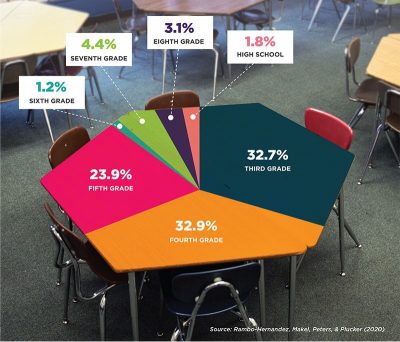
Research shows that a typical fifth grade classroom might have a five to seven grade academic achievement range (Peters et al., 2017; Rambo-Hernandez et al., 2020). We also know from our previous research that when teachers are given time to differentiate content and instruction, they tend to exclusively focus on struggling learners (Kenny et al., 2024). Some students simply outpace their grade-level curriculum requirements. For those who have fully mastered their grade-level curriculum, whole-grade acceleration is often warranted.
We suggest that students who are achieving two grade levels ahead in reading and mathematics are possible candidates for whole-grade acceleration. This would be a second-grade student who is scoring minimally at the 50th percentile nationally on fourth grade reading and fourth grade mathematics achievement tests. Students considered for whole-grade acceleration also tend to be in the top 10% on cognitive tests. Depending on the school size, one or two students in a given grade might be good candidates for whole-grade acceleration, although this can vary. Additionally, about 10% of students are candidates for mathematics or reading/language arts subject acceleration.
The decision whether to grade skip a student is an important one and a concern for most parents and educators. Our acceleration research is based on the premise that schools would be more likely to promote whole-grade acceleration of gifted students if there were a universal screening process to identify children to be considered for acceleration and teachers were better trained to evaluate the appropriateness of acceleration for students. We are conducting a random controlled trial using an intervention that (a) provides online professional learning for teachers and other relevant school personnel to increase awareness of acceleration as a useful intervention for academically advanced students, (b) establishes a universal screening process to determine when and for whom the Integrated Acceleration System should be administered, and (c) trains teachers and other relevant school personnel to interpret screening data relevant to the acceleration decision using the Integrated Acceleration System.